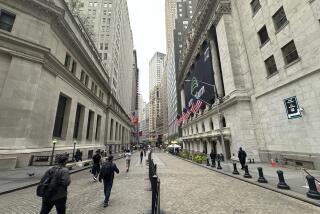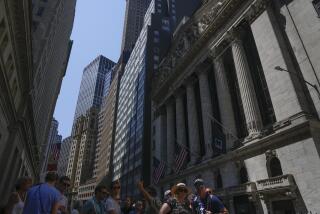Markets in Tokyo Open Sluggishly; Oil Prices Firmer
- Share via
TOKYO — After spending the weekend reflecting on events in the Gulf, investors returned to the market today far more uncertain about the chances for a quick end to the war against Iraq. The uncertainty was reflected in sluggish, see-saw trading on the Tokyo Stock Exchange throughout the morning.
Oil prices were firmer in early trading, traders saying the market was bouncing back from last week’s sharp losses. Overnight Iraqi missile attacks on Saudi Arabia also raised concern about future oil supply.
North Sea Brent crude oil for March delivery was valued at $19.20 a barrel this morning, up from opening bids of about $18.20.
“The Iraqi counterattack was pretty strong and will probably continue all week,” said Keiji Yasuda, stock strategist for New Japan Securities. Until the extent of Iraq’s retaliatory capability can be evaluated, he said, “most investors are taking a wait-and-see attitude.”
“This is a critical period,” he added. “By the end of the week, we should have a good idea of where the war is headed.”
The Nikkei average drifted down 283.79 points in slow trading to close the morning session at 23,524.51. Traders said the decline was a natural adjustment after a 1,400-point rise on Thursday and Friday.
Traders found time to sit back and read their newspapers on the first slow trading day since Jan. 15, when the market fell 770 points in anticipation of war. Clerks stood on the exchange floor gossiping.
“It’s hard to see ahead, so things are pretty slow,” said one trader. “There is no longer the feeling that the war will be over right away.”
Investors were also reluctant to move in the absence of more information on oil and gold markets overseas. The Tokyo market is the first of the major markets to open each day.
The dollar opened early today at 132.12 yen in Tokyo, down 1.48 yen from Friday’s close. It strengthened mildly during morning trading. Analysts said the yen’s modest rise was largely a reaction to lower oil prices and had little impact on the stock market.
After the war broke out, perhaps the biggest surprise was the record decline in oil prices, which helped lift other markets. Oil had reached a high of about $41 a barrel a few months earlier, when traders feared that the war could threaten Saudi supplies. But it fell below $20 per barrel Friday, to levels not seen since before the invasion.
Analysts and traders doubt that the war can push crude prices back to their high levels, even if Israel were to get involved, because Israeli participation would not necessarily pose any threats to oil fields.
Instead, the fundamentals of supply and demand may start having more influence on energy markets, which have swayed back and forth on war and peace rumors for nearly six months. Soon, producing nations could even start feeling pressure to cut back the amount of crude they pump, experts said.
The Soviet crackdown on pro-independence groups in the Baltic states of Lithuania, Latvia and Estonia also contributed to uncertainty in the stock market, a Nikko Securities analyst said.
Traders will look closely at a communique to be released later today by finance leaders of the Group of Seven major industrial nations after their two-day meeting in New York. The group was expected to discuss financial support for the effort against Iraq.
More to Read
Inside the business of entertainment
The Wide Shot brings you news, analysis and insights on everything from streaming wars to production — and what it all means for the future.
You may occasionally receive promotional content from the Los Angeles Times.










